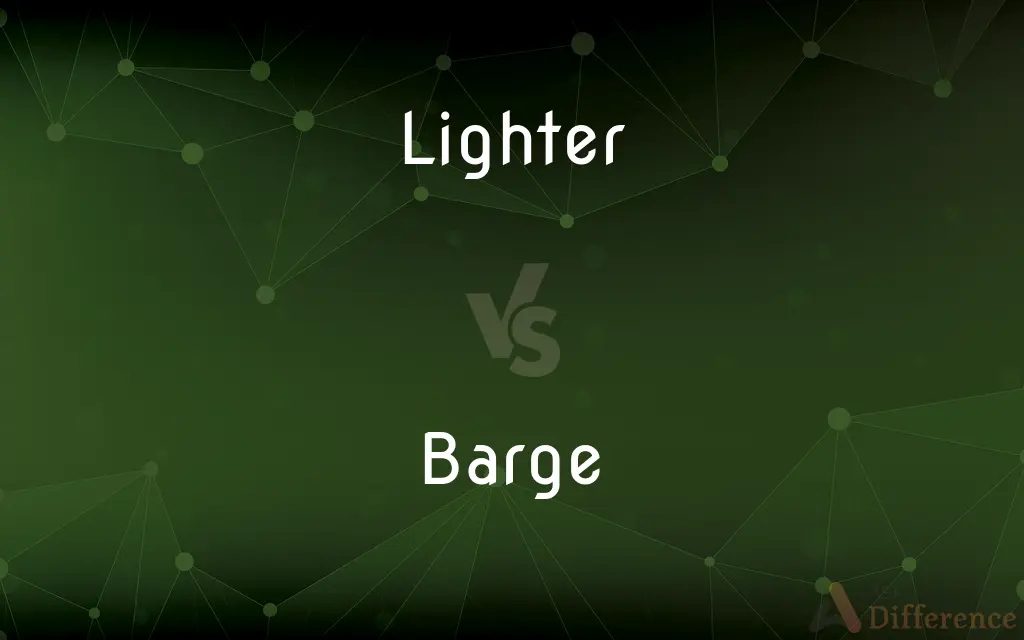Lighter vs. Barge — What's the Difference?
By Fiza Rafique & Maham Liaqat — Updated on March 29, 2024
Lighters are flat-bottomed boats designed for transporting goods to and from ships, whereas barges are large, flat-bottomed vessels for carrying freight on rivers and canals.

Difference Between Lighter and Barge
Table of Contents
ADVERTISEMENT
Key Differences
A lighter is a type of flat-bottomed barge, but it specifically serves to transfer goods to and from moored ships, facilitating the loading and unloading process in harbors or ports where the water may be too shallow for the ships to dock. These vessels are essential for short-distance transports, such as moving cargo from a ship to the shore or between ships. On the other hand, a barge is a broader category of flat-bottomed vessels used primarily for transporting heavy goods across rivers, canals, and other inland waterways. Barges are known for their large carrying capacity, making them a cost-effective solution for bulk transportation of materials like coal, timber, and steel.
Lighters, due to their specialized role, often operate within the confines of a port or between nearby points along the coast. They are designed to be highly maneuverable and can be either self-propelled or towed. Barges, in contrast, are built for longer distances along inland waterways and are typically pushed or towed by tugboats. They play a vital role in the intermodal transport chain, connecting sea transport with inland destinations.
While lighters are integral to the logistics within ports, assisting in the distribution of international cargo, barges serve the inland transportation needs, moving goods between ports and inland distribution points or factories. The operation of lighters is crucial for efficient port logistics, especially in locations where larger vessels cannot directly access docks. Meanwhile, barges are key to reducing congestion on roads and highways, offering a more environmentally friendly alternative for bulk transportation.
The design of lighters and barges reflects their distinct purposes. Lighters are often equipped with cranes and other equipment for handling cargo, optimizing them for quick loading and unloading. Barges, however, are designed for capacity and efficiency over long distances, with configurations that maximize cargo volume and minimize operational costs.
Comparison Chart
Primary Use
Transferring goods to/from ships in port
Transporting freight on rivers and canals
ADVERTISEMENT
Environment
Coastal, short distances, within harbors
Inland waterways, longer distances
Design
Flat-bottomed, often equipped for cargo handling
Flat-bottomed, optimized for volume and efficiency
Propulsion
Self-propelled or towed
Typically towed or pushed
Capacity
Smaller, for short-distance transfers
Larger, for bulk transportation
Compare with Definitions
Lighter
Can be part of a lighter aboard ship (LASH) system.
The LASH barge was loaded onto the mother ship for ocean transit.
Barge
Often pushed or towed by tugboats.
A tugboat guided the loaded barge through the canal.
Lighter
A flat-bottomed boat used for transferring cargo to and from ships.
The cargo was offloaded onto a lighter for transport to the dock.
Barge
Key in reducing road congestion.
Barges offer a greener alternative for transporting bulk goods.
Lighter
Operates primarily in port areas.
Lighters are essential for quick turnaround in busy ports.
Barge
Versatile in cargo capacity.
The barge was configured to maximize the transport of liquid cargo.
Lighter
May be equipped with cranes.
The lighter used its onboard crane to unload the containers.
Barge
A large, flat-bottomed vessel for transporting freight on waterways.
Coal was transported down the river on a barge.
Lighter
Essential for logistic operations in shallow waters.
In shallow ports, lighters facilitate the transfer of goods where larger ships can't dock.
Barge
Used for inland cargo transport.
The barge carried agricultural products to the port city.
Lighter
A lighter is a portable device which generates a flame, and can be used to ignite a variety of items, such as cigarettes, gas stoves, fireworks, candles or campfire. It consists of a metal or plastic container filled with a flammable liquid or compressed gas, a means of ignition to produce the flame, and some provision for extinguishing the flame.
Barge
A barge is a shoal-draft flat-bottomed boat, built mainly for river and canal transport of bulk goods. Originally barges were towed by draft horses on an adjacent towpath.
Lighter
Electromagnetic radiation that is visible, perceivable by the normal human eye as colors between red and violet, having frequencies between 400 terahertz and 790 terahertz and wavelengths between 750 nanometers and 380 nanometers. Also called visible light.
Barge
A long, large, usually flatbottom boat for transporting freight that is generally unpowered and towed or pushed by other craft.
Lighter
Electromagnetic radiation of any frequency or wavelength.
Barge
A large, open pleasure boat used for parties, pageants, or formal ceremonies.
Lighter
The sensation of perceiving light; brightness
A sudden light that made me blink.
Barge
A powerboat reserved for the use of an admiral.
Lighter
A source of light, especially a lamp, a lantern, or an electric lighting fixture
Turn out the lights when you leave.
Barge
To carry by barge.
Lighter
The illumination derived from a source of light
By the light of the moon.
Barge
To move about clumsily.
Lighter
The particular quantity or quality of such illumination
Moved the lamp closer to get better light.
Barge
To intrude or interrupt, especially rudely
Barged into the meeting.
Lighter
The pathway or route of such illumination to a person
You're standing in his light.
Barge
A large flat-bottomed towed or self-propelled boat used mainly for river and canal transport of heavy goods or bulk cargo.
Lighter
A source of fire, such as a match or cigarette lighter.
Barge
A richly decorated ceremonial state vessel propelled by rowers for river processions.
Lighter
A mechanical device that uses illumination as a signal or warning, especially a beacon or traffic signal.
Barge
A large flat-bottomed coastal trading vessel having a large spritsail and jib-headed topsail, a fore staysail and a very small mizen, and having leeboards instead of a keel.
Lighter
Daylight.
Barge
One of the boats of a warship having fourteen oars
Lighter
Dawn; daybreak.
Barge
The wooden disk in which bread or biscuit is placed on a mess table.
Lighter
Something, such as a window, that admits illumination.
Barge
(US) A double-decked passenger or freight vessel, towed by a steamboat.
Lighter
(Architecture) One of two or more openings in a window divided by a mullion or mullions.
Barge
A large omnibus used for excursions.
Lighter
Something that provides information or clarification
Research that produced little new light on the question.
Barge
To intrude or break through, particularly in an unwelcome or clumsy manner.
Lighter
A state of awareness or understanding, especially as derived from a particular source
In the light of experience.
Barge
(transitive) To push someone.
Lighter
Public attention; general knowledge
Brought the scandal to light.
Barge
A pleasure boat; a vessel or boat of state, elegantly furnished and decorated.
Lighter
Spiritual awareness; illumination.
Barge
A large, roomy boat for the conveyance of passengers or goods; as, a ship's barge; a charcoal barge.
Lighter
A way of looking at or considering a matter; an aspect
Saw the situation in a different light.
Barge
A large boat used by flag officers.
Lighter
(Archaic) Eyesight.
Barge
A double-decked passenger or freight vessel, towed by a steamboat.
Lighter
Lights One's individual opinions, choices, or standards
Acted according to their own lights.
Barge
A large omnibus used for excursions.
Lighter
A person who inspires or is adored by another
My daughter is the light of my life.
Barge
A flatbottom boat for carrying heavy loads (especially on canals)
Lighter
A prominent or distinguished person; a luminary
One of the leading lights of the theater.
Barge
Push one's way;
She barged into the meeting room
Lighter
An expression of the eyes
A strange light in her eyes.
Barge
Transport by barge on a body of water
Lighter
Lights Pieces of laundry that are not dark in color.
Lighter
Light In Quaker doctrine, the guiding spirit or divine presence in each person.
Lighter
One that ignites or kindles.
Lighter
A mechanical device for lighting a cigarette, cigar, or pipe.
Lighter
A large flatbottom barge, especially one used to deliver or unload goods to or from a cargo ship or transport goods over short distances.
Lighter
To set on fire; ignite or kindle
Lit the kindling.
Lighter
To cause to give out light; make luminous
Lit a lamp.
Lighter
To provide, cover, or fill with light; illuminate
Fireworks lighting the sky.
Lighter
To signal, direct, or guide with light
"You'd ... set the lamp in the dormer window to light him home through the storm" (Edith Nesbit).
Lighter
To enliven or animate
A smile lit her face.
Lighter
To start to burn; be ignited or kindled
Green wood does not light easily.
Lighter
To emit light; be lighted
Wait until the indicator lights up.
Lighter
To convey (cargo) in a lighter.
Lighter
To get down, as from a vehicle or horse; dismount.
Lighter
To descend to the ground after flight; land.
Lighter
To come upon one unexpectedly
Misfortune lighted upon him.
Lighter
To come upon by chance or accident. Used with on or upon
Lit on the perfect solution to the problem.
Lighter
Having a greater rather than lesser degree of lightness.
Lighter
Of or being an additive primary color.
Lighter
Characterized by or filled with light; bright
A room that is light when the shutters are open.
Lighter
Not dark in color; fair
Light hair and skin.
Lighter
Served with milk or cream. Used of coffee.
Lighter
Of relatively little weight; not heavy
A light load.
Lighter
Of relatively little weight for its size or bulk
Balsa is a light wood.
Lighter
Of less than the correct, standard, or legal weight
A light pound.
Lighter
Designed for ease and quickness of movement; having a structure that is slim and has little weight for its type or class
Light aircraft.
Lighter
Designed to carry relatively little weight
Light trucks.
Lighter
Carrying little equipment or armament
Light cavalry.
Lighter
Requiring relatively little equipment and using relatively simple processes to produce consumer goods
Light industry.
Lighter
Exerting little force or impact; gentle
A light pat.
Lighter
Indistinct; faint
Light print that I could barely make out.
Lighter
Low in quantity or intensity
Light traffic.
Light snow.
Lighter
Consuming or using relatively moderate amounts; abstemious
A light eater.
A light smoker.
Lighter
Not harsh or severe
Gave the offender a light sentence.
Lighter
Moving easily and quickly; nimble
You're very light on your feet.
Lighter
Easy to perform or accomplish; requiring little effort
Light chores.
Lighter
Easy to bear or endure
A light tax.
Lighter
Having little importance; insignificant
Light conversation.
Lighter
Intended primarily as entertainment and lacking serious or weighty content
A light comedy.
Lighter
Not solemn or serious
Spoke in a light manner of the situation.
Lighter
Free from worries or troubles; blithe
A light heart.
Lighter
Mildly dizzy or faint
Felt light in the head.
Lighter
Easily awakened or disturbed
A light sleeper.
Lighter
Easily digested
A light supper.
Lighter
Containing a relatively small amount of a potentially harmful ingredient, such as alcohol, fat, or sodium
Light beer.
Light mayonnaise.
Lighter
Having a spongy or flaky texture; well-leavened
Light pastries.
Lighter
Having a loose, porous consistency
Light soil.
Lighter
Of, relating to, or being a syllable ending in a short vowel or a short vowel plus a consonant.
Lighter
Of, relating to, or being a vowel or syllable pronounced with little or no stress.
Lighter
In a light manner; lightly.
Lighter
With little weight and few burdens
Traveling light.
Lighter
A person who lights things.
A lighter of lamps
Lighter
A device used to light things, especially a reusable handheld device for creating fire to light cigarettes.
Cigarette in mouth, he clutched his pockets in search of a lighter.
Lighter
A flat-bottomed boat for carrying heavy loads across short distances (especially for canals or for loading or unloading larger boats).
Lighter
To transfer (cargo or passengers) to or from a ship by means of a lighter or other small vessel.
Lighter
To transfer cargo or fuel from (a ship), lightening it to make its draft less or to make it easier to refloat.
Lighter
One who, or that which, lights; as, a lighter of lamps.
Lighter
A large boat or barge, mainly used in unloading or loading vessels which can not reach the wharves at the place of shipment or delivery.
Lighter
To convey by a lighter, as to or from the shore; as, to lighter the cargo of a ship.
Lighter
A substance used to ignite or kindle a fire
Lighter
A device for lighting or igniting fuel or charges or fires;
Do you have a light?
Lighter
A flatbottom boat for carrying heavy loads (especially on canals)
Lighter
Transport in a flatbottom boat
Common Curiosities
How do lighters and barges contribute to logistics?
Lighters enhance port efficiency by enabling cargo transfer in shallow waters, while barges extend the logistics chain inland, bridging sea and land transport.
Are all lighters flat-bottomed?
Yes, lighters are flat-bottomed to navigate shallow waters easily and facilitate cargo handling.
What distinguishes a lighter from a barge?
A lighter specifically facilitates cargo transfer in port areas, while a barge is used for broader inland waterway freight transport.
Can lighters operate independently?
Some lighters are self-propelled, allowing them to operate independently for short distances.
What types of goods are typically transported by barges?
Barges are versatile, transporting a wide range of goods including bulk commodities, industrial products, and sometimes even passengers.
Why are barges important for inland transportation?
Barges play a crucial role in inland transportation by providing a cost-effective and environmentally friendly option for moving bulk goods.
How are lighters and barges adapted for different cargoes?
Both can be equipped or configured differently to handle various types of cargo, from bulk commodities to specialized equipment.
Can a lighter be part of a ship?
Yes, in a lighter aboard ship (LASH) system, lighters can be loaded directly onto a mother ship for ocean transport.
What makes barges environmentally friendly?
Barges minimize the environmental impact by reducing road traffic and offering a more fuel-efficient way to move large quantities of goods.
How does the design of a barge enhance its efficiency?
Barges are designed to maximize cargo volume and minimize operational costs, making them an efficient mode of transportation for heavy goods.
Is it common for barges to operate on seas?
While primarily designed for rivers and canals, some barges are also used in coastal waters, depending on their design and the cargo.
How do tugboats interact with barges?
Tugboats push or tow barges along waterways, guiding them through tight spaces and ensuring safe navigation.
What role do lighters play in global trade?
Lighters facilitate international trade by enabling the transfer of cargo in ports, ensuring the smooth flow of goods across global supply chains.
How do lighters contribute to port operations?
Lighters are essential for quick cargo transfer, especially in ports where large vessels cannot dock directly, enhancing operational efficiency.
What challenges do lighter operations face?
Lighter operations can be challenged by weather conditions, port congestion, and the logistics of coordinating with larger vessels.
Share Your Discovery

Previous Comparison
Fluorescence vs. Bioluminescence
Next Comparison
Hax vs. HapAuthor Spotlight
Written by
Fiza RafiqueFiza Rafique is a skilled content writer at AskDifference.com, where she meticulously refines and enhances written pieces. Drawing from her vast editorial expertise, Fiza ensures clarity, accuracy, and precision in every article. Passionate about language, she continually seeks to elevate the quality of content for readers worldwide.
Co-written by
Maham Liaqat














































